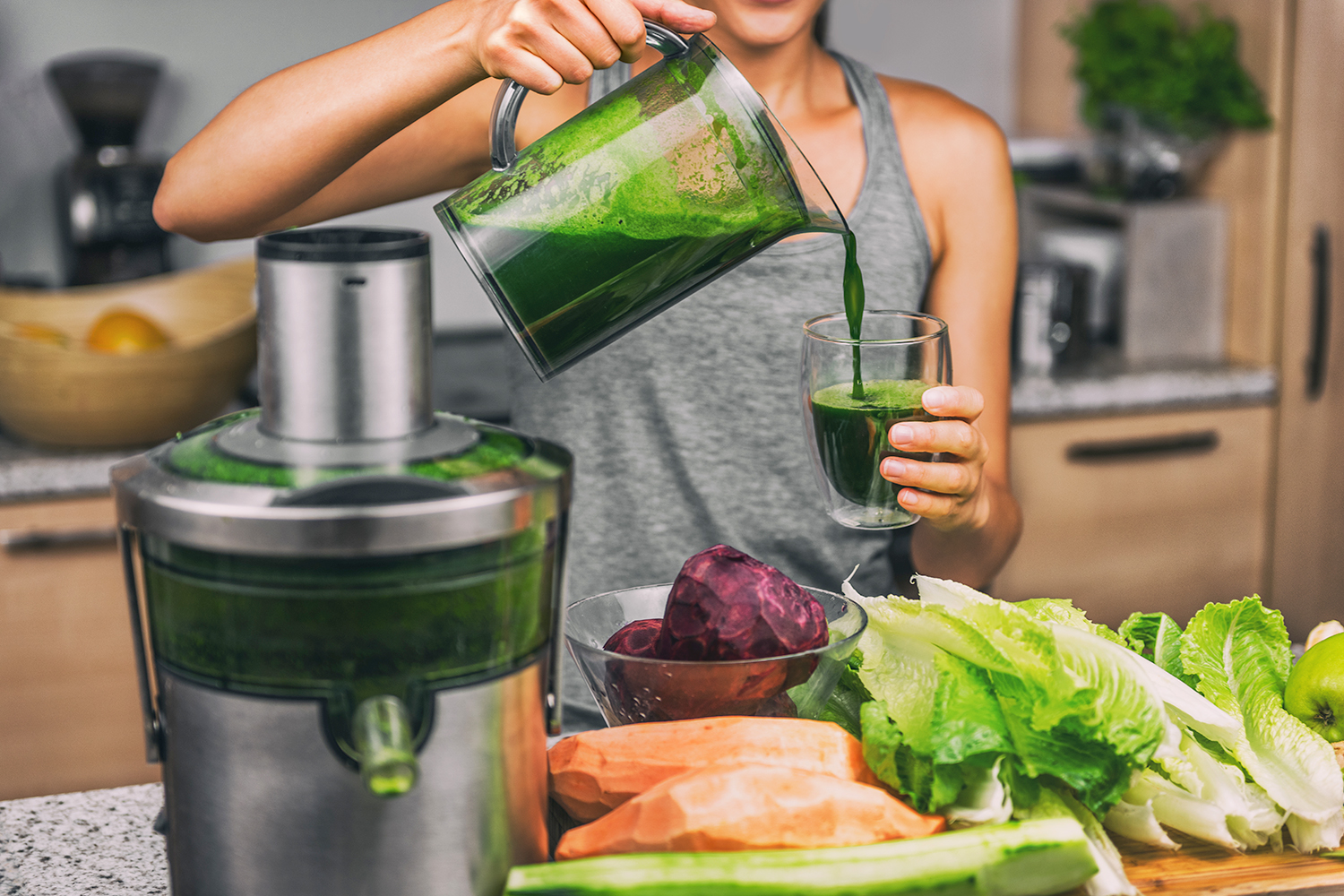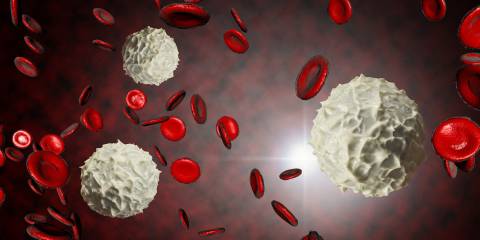Tired of strict weight-loss programs that make you think of "forbidden" foods all the time? It’s time to kick dieting to the curb. To find and maintain lifelong healthy weight, embrace lifestyle changes. Here are seven to start with.
Lifestyle Tips for Weight Loss
-
Address Your Body’s Many Cries for Nutrients
You may think you’re craving a chocolate-covered doughnut, but in reality, your body really wants vitamins, minerals, phytonutrients, essential amino acids, essential fats, lean protein, and, of course, carbs for energy. You simply misinterpreted the signal! To minimize cravings, create a multicolored menu with a variety of fruits, vegetables, nuts, and seeds.
Make it a goal to eat 7 to 10 servings of fruits and vegetables daily, and see how much room you have for anything else! Cravings will diminish when your body is getting the nutrients it needs for optimal health.
Supplemental Support
To round out your craving-crushing menu, start the day with a green drink containing nutrients you won’t likely eat otherwise. Barley, alfalfa, wheatgrass, and red beets are great sources of chlorophyll. Greens drinks and supplements give you the nourishing benefits of sea veggies like spirulina, chlorella, and Atlantic dulse without having to put them on your plate!
Look for green beverages or mixes containing antioxidant powerhouses like acerola cherries, bilberry, and grape extracts. Research also supports the use of chromium picolinate to reduce cravings.
-
Balance Your Blood Sugar—and The Scale
A second major stumbling block with fat-loss plans is caused by blood sugar fluctuations that have your energy bottoming out several times a day—leading you straight to the snack machine. Focus on stabilizing your blood sugar by eating some protein with every meal and snack, starting with breakfast. Protein not only keeps the munchies at bay, but also helps to build lean muscle.
Adequate dietary fiber helps to slow the release of glucose into the bloodstream.
Supplemental Support
To set yourself up for a balanced day, toss some whey protein isolate powder into a smoothie, along with berries, banana, or your favorite fruits. For fiber, glucomannan from konjac root is a water-soluble polysaccharide that helps to provide a feeling of fullness so you aren’t as inclined to snack.
Glucomannan also slows the release of glucose into the bloodstream to help prevent energy highs and lows.
-
Rein in Emotional Eating
It’s my observation that 98 percent of us have emotional connections to food, and the other 2 percent aren’t telling the truth! To put an end to sabotaging behavior, determine your emotional triggers and substitute a non-food comfort—like journaling, exercising, or talking with a friend. Emotional eating can become a serious issue in the wintertime, when reduced sun exposure leads to lower levels of the feel-good hormone serotonin.
Likewise, a woman’s menstrual cycle can trigger fluctuating serotonin levels. Because carbohydrate consumption naturally stimulates serotonin production, it’s no wonder we reach for cookies or French fries.
Support healthy serotonin production by eating foods containing vitamin B6 and the serotonin precursor tryptophan: whole grains, oatmeal, brown rice, and turkey are good foods to include.
Supplemental Support
Consider supplementing with precursor 5-Hydroxytryptophan (5-HTP) to help boost serotonin levels. Keep your digestive tract healthy with daily probiotic supplements: We’re starting to learn more about the gut/brain/mood connection. Healthy serotonin levels are closely linked to a strong digestive tract.
-
Burn, Baby, Burn
We all know the simple equation that leads to fat loss: more calories out than calories in. Aim to exercise several times per week, and be sure to include muscle-building, weight-bearing activity.
Supplemental Support
Some foods are thermogenic, meaning they help kick your metabolic rate into high gear so you burn more calories. Look for supplements containing epigallocatechin-3-gallate (EGCG) from green tea or capsaicin from hot peppers to boost your burn. Conjugated linoleic acid (CLA) also helps support fat-loss goals, possibly by helping to suppress appetite and increase energy output.
-
Eat Fat to Burn Fat
Your body requires fat to create the membranes for every cell in your body, and your brain relies on good fats too. While we want to limit saturated fats and avoid trans fats, skipping dietary fat altogether is the best way to get your body to hold onto it. If you’d like to lose the love handles, choose fats that boost metabolism.
Supplemental Support
Long-chain polyunsaturated omega-3 fats EPA and DHA from fish oil may protect against the development of obesity, and they can help to reduce body fat in those who are already overweight. Be sure to take daily fish oil (or marine algae) supplements.
-
Seek Balance to Soothe The Savage Muffintop
Weight gain around the middle is frequently caused by imbalanced hormones. Men typically get the so-called beer belly when testosterone levels start to drop: The spare tire is caused by excess estrogen in relation to testosterone. Men can boost testosterone levels with regular, weight-bearing exercise and adequate sleep. A woman’s expanding waistline often occurs due to adrenal exhaustion triggered by chronic stress.
Supplemental Support
Adaptogenic herbs like licorice root, eleuthero, and astragalus help your body adapt to stress so your adrenals don’t have to work so hard. For men, ingredients like chrysin (extracted from plants or bee propolis) may block the enzyme (aromatase) responsible for converting testosterone into estrogen.
Stinging nettle root extract competes with a protein called SHBG (sex hormone binding globulin) that makes testosterone unavailable to the body, while indole 3 carbinol and sulforaphane help regulate the production of good estrogens (2-hydroxy estrone) and inhibits the production of bad estrogens (16-hydroxy estrone) that can lead to imbalances.
-
Rediscover Sleep, Glorious Sleep
Mounting research shows the connection between sleep deficits and weight gain.
-
General Studies
Women who sleep less than six hours per night on average have significantly greater odds of obesity than women who sleep between seven and eight hours nightly.
Just one night of sleep deprivation in men triggers reduced morning energy expenditures, leading to weight gain. Create slimming sleep habits!
-
Sleep and Sugar Consumption
British scientists determined that adults who upped their sleep time managed to cut down on sugary foods.
The Sleep Study
The study included adults who typically slept for less than seven hours per night.
- Some participants were instructed to increase their slumber by about an hour and a half, and to follow good sleep habits such as:
- avoiding caffeine before bed
- establishing a relaxing routine
- not going to bed too full or hungry
- The others made no changes to their sleep habits.
- All participants in both groups kept food diaries during the seven-day trial.
The Results of the Study
Those in the group that increased their sleep time consumed about 10 fewer grams of sugar per day.
“The fact that extending sleep led to a reduction in intake of free sugars, by which we mean the sugars that are added to foods by manufacturers or in cooking at home as well as sugars in honey, syrups, and fruit juice, suggests that a simple change in lifestyle may really help people to consume healthier diets,” said researcher Wendy Hall, PhD.
- Some participants were instructed to increase their slumber by about an hour and a half, and to follow good sleep habits such as:
Supplemental Support
Non-habit forming supplements can help bring on the slumber. Melatonin supports deep sleep; L-theanine promotes relaxation.
-




